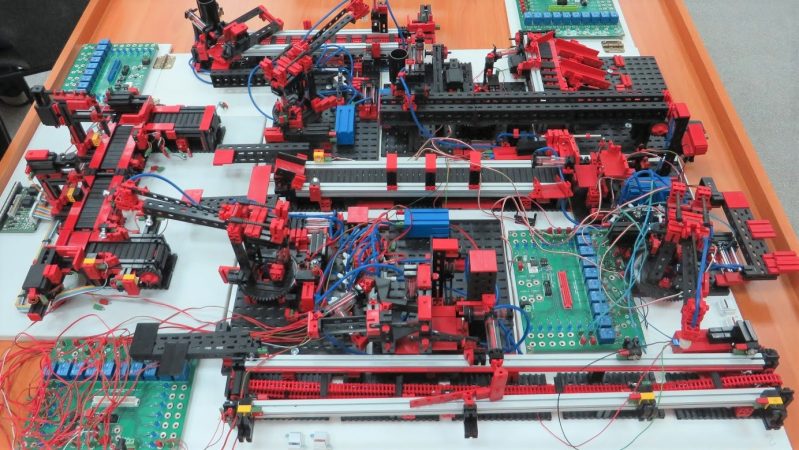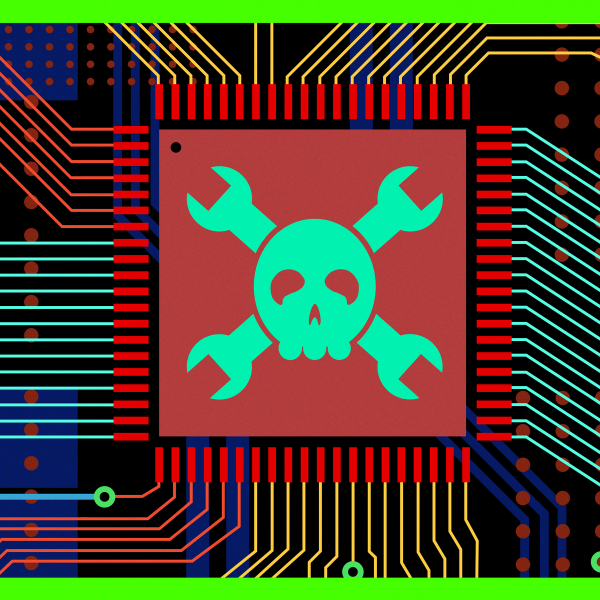How to train young engineers in industrial automation is a thorny issue. Most factories have big things that can do a lot of damage and cost tons of money if the newbie causes a crash. Solution: shrink the factory down to desktop size and let them practice on that.
Luckily for [Vadim], there’s an off-the-shelf solution for miniaturizing factory automation: FischerTechnik industrial training models. The models have motors, conveyors, pneumatic cylinders, and sensors galore, but the controller is not exactly the industry standard programmable logic controller (PLC). [Vadim] set out to remedy this by building an interface between the FischerTechnik models and a Siemens PLC. He went through a couple of revisions of his board, including one using rivets from the sewing store to interface with the FischerTechnic connectors. Eventually, he settled on more robust connectors and came up with a board that lets students delve into PLC programming without killing anyone. The video below shows it going through its paces; we can only imagine where playing with these kits as a kid would have led us.
As great as [Vadim]’s system is for training engineers, we can also see it helpful in getting kids interested in a career in industrial automation. We recently covered a similar effort to show kids big science using LEGO Mindstorms. Both of these can help get STEM kids to see the wider world of technical careers and perhaps steer them into automation. After all, the people who make the robots are probably going to be the last ones obsoleted, right?
















The industrial engineer’s version of a tabletop train layout.
Yah, snaps, poppers, rivets whatever you want to call them can be handy in the hacker inventory. Custom connectors, small hatch closures etc.
Rivets, they are named rivets. If you call them something else then you are not calling them by their name.
Derp, yes pre caffeine optimum comment, closer look they are rivet rivets. First glance this morn I took them for the poppers/snaps that can be sewn or rivetted on, wherein part of the device is rivetty, but that’s just to put it where you want it.
But anyhoo, snaps/poppers, whether rivet on or not are useful.
These are “rivets from the sewing store”. I’d call them poppers. A quick Google of “sewing rivets” came up with stuff about sewing actual rivets, the type you get on jeans, and a couple of links to things named “sewing poppers”. I’ve never heard them called rivets before, doesn’t seem to be a common name among sewers.
Oh, I see, they’re jeans-type rivets.
It actually is available to children. Fischertechnik has a lineup of robotics sets in germanys toy stores that is actually more expansive than lego mindstorms these days.
More expensive too, I bet.
Growing up the only place I ever saw Fischertechnik was in books about robotics. And later on at college. They were far too expensive for kids to own. Shame cos they look like they’d be educations. Why is injection-moulded plastic so expensive?
Or rather, why is Fischertechnik so expensive? The cheap Chinese knockoff Lego manages to sell for pennies. Wonder why they charge so much? They might be able to sell in the actual toy market and make a huge profit. If they needed to, they could hive off their existing product as some sort of industrial / engineering version, to allow them to keep charging such ridiculous prices to their existing market. They could even miss out certain parts from the toy version, to keep the distinction.
Growing up, Fischertechnik would have been very cool. As it is I was lucky to get Lego, and that could sell for around a hundred quid for a big set, back in the 1980s.
Hopefully Lego’s patent expiring will do something to help that. Or kill them off quickly. Is Fischertechnik patented?
“Is Fischertechnik patented?”
Almost certainly and it’s not a company you want to risk coming into conflict with if you’re trying to run a business.
I’m not familiar with the current situation, but I do know that several years ago, some of their outside ‘legal representatives’ worked out of the same pigsty as those of a certain rather infamous Italian patent troll.
The same one which arranged a raid on a German consumer electronics show by over two hundred ARMED customs officers.
Surely, the first patents on Fischertechnik have already expired.
I’ll say. I looked up the cost of one of those sets on a whim, and it translated into something like $4,200 USD!
Indeed, and I still love to buy the stuff occasionally; it is still produced (they even make a 3-d printer). When i was a kid I was fortunate my parents bought me both lego and fischertechnic. At that time it was somewhat available in the Dutch toy-stores. It as always been more pricey than lego. But in my experience the materials used were stronger and more related to the actual engineering world. Especially if you looked at the old ’70 and ’80 kits. Also very good didactic booklets. I still make robot arms and alike with this stuff, controlling it with the orginal fT Interfaces,LabVIEW myRIO and stuff like arduino, pi etc.
What surprise me a bit in the story is that fT delivers industrial kits prepared for 24V control so it would directly interface with most common PLC’s. But…never had the change to see one of these industry kits first hand
This is awesome. I’ve done PLC programming for 25 years and this would have been far more interesting than pretending to run an elevator and traffic lights, which is what we had to do.
I’m also amused that about every five years, all the trade-rags are convinced that PLC’s are over and everything will be replaced with PC based controls. And then they aren’t.
PC’s are complicated and fussy. More stuff to go wrong.
Sadly, everyone want’s to “wake the world up:”
https://www.youtube.com/watch?v=EFiFw5AF_mM
I have an Entertron Smart-Pak PLC. pretty old one, hand written in sharpie is 10/92 188. I presume it’s the 188th unit made in October, 1992. (Surely they would have shipped more than that all year.) Typewritten label on the firmware chip is SMART-PAK Ver 3.24.
Amazingly, the company was able to dig up documentation and software for it. IIRC the newest 32bit Windows software that supports it so it can be setup using 64bit Windows. It has 6 channels, I may see about using it to control a tool changer or something on a CNC mill.
The company did tell me there still are a few of their earliest PLCs like this one still in use. They do the jobs they’re capable of, no sense replacing them with something that can do a lot more when the extra features won’t be used. Many PLC controlled systems aren’t like CNC lathes and mills where upgrading the control system can make then run faster and do things impossible with the original controls.
“I’m also amused that about every five years, all the trade-rags are convinced that PLC’s are over and everything will be replaced with PC based controls. And then they aren’t.”
They’ve been saying something along those sort of lines since practical, ‘low cost’ single board computers became readily available during the early to mid 80’s.
My employer at the time used to get a flurry of enquiries from companies wanting us to design a controller to replace their PLCs every time one of these articles popped up.
It took a lot of tact and diplomacy, (they might want something more practical in the future), to explain to them that there is a lot more to a PLC than just the ‘computer’.
For older children, Festo has a line of similar devices used in academic technical/engineering training as well. They look like a lot of fun (but they won’t give me any samples).
http://www.festo-didactic.com/int-en/learning-systems/mps-the-modular-production-system/mps-modules/?fbid=aW50LmVuLjU1Ny4xNy4yMC4xMzM1
When I went to school in the late 90s we hade several different small and larger systems like these to practise and test with, although a lot have happened since then in VR, processing power and so forth. Physical props are more fun than virtual, and you get a hands on pratical feeling. And learn from weirds shit that happen sometimes in the real world with real connectors/parts/fluids/gases/metals. Many of the different practise systems were built by students, which in itselfs are good practise; Having a problem and building a system too solve it.
I came across this in the UK circa late 80s early 90s, but the school only had a small kit, and I was given the impression then that it was discontinued. Maybe it was dropped from a particular distribution chain.
Some manufacturers are closing the gap between industril hardware and more “hacker friendly” like Raspi http://info.opto22.com/hs-fs/hubfs/Products/Assembled-raspberry-pi-digital-io-starter-kit-with-power.jpg?t=1492192672904&width=609&height=217&name=Assembled-raspberry-pi-digital-io-starter-kit-with-power.jpg http://info.opto22.com/raspberry-pi-io
Is there a Simulator PLC Software Application that will also teach without the expense.
Yup, I actually included one of these in my article:
https://en.wikipedia.org/wiki/Plant_Simulation
Can be obtained free of charge for students iirc…
Ooh I remember these from university. We used the same kits connected to real Siemens PLCs. These things were really a lot of fun.
If you want to learn ladder, in the Rockwell world, you can download a copy of their RSLogix emulator for free. Just takes an email address to signup, can be a throwaway.
Just be sure to get the exact version shown in the instructions as the newer versions are for paid customers only.
https://theautomationblog.com/how-to-get-a-free-copy-of-rslogix-emulate-500/
Here is a video of it in-use with a free HMI package
https://www.youtube.com/watch?v=JDtgIS-nj7I
An excellent resource for PLC questions is this forum
http://www.plctalk.net/qanda/forumdisplay.php?f=2
Funny thing is I remember when free PLC (along with CNC) programs were hard to find, and the one’s available weren’t very good. We’ve come far.
That free DL seems no longer there. Eventually, after signing up etc, RSLogix Emulate 500 6.00.00 DL goes to a ‘software entitlement check’ page where a serial# and product key are prompted for.
Through Find ~ Type “Emulate” ~ Click Compare
Under the version 6.00.00 in the right-hand column there is an icon with a grey arrow pointing down, choose that. (there is a tiny yellow PDF icon adjacent to it)
Click the “Downloads 1” in the upper-right of the popup dialog.
Click “Download Now”. There is a EULA to agree to.
Click the yellow “Direct Download” button, Click the resulting link from that.
Tnx! Compare was the key.
Looking at Vadim’s set up, it looks like he’s invested around $10,000.00. These industrial training models are not cheap. Still for schools, it’s a wonderful way of exposing kids to industrial automation and PLC’s.
Instead of using an expensive Siemens PLC, he could have used the open source OpenPLC project (www.openplcproject.com). It is compatible with all the 5 IEC 61131-3 PLC languages, has SCADA support, run on a variety of different hardware, from PC to RaspberryPi, and has FischerTechnik drivers off the shelf.
If it’s for teaching, it’s much better to have the stuff that’s actually used in reality. Expecting kids to remember “well, it’s the same IN PRINCIPLE as this, except blah blah won’t be the same” is adding another barrier between knowledge and kids’ brains.
Admittedly the sort of people who can think “in principle” extensively, and reduce things down to functional units in their heads, are probably the kids who are gonna grow up into engineers anyway. But maybe exposing the Norms to stuff like this will catch a few stragglers, or at least mean the ordinary adults of tomorrow understand how the world works a bit better. That’s always a good thing, and too rare nowadays.
Excluding the humans from the headlines or the actions is very Cylon, plus inaccurate. I’m in favor of putting them back. Every time. For example, “Desktop Factory Teaches PLC Programming” will become “Teachers use PLC Programming with Desktop Factory”. Or is a self-teaching situation, “People Learn PLC Programming with Desktop Factory”. Is that so bad?
Arduino’s don’t do anything on their own. Fight the diminishment of the human being!
See also the VEX robotics work cell https://www.vexrobotics.com/v5-workcell.html